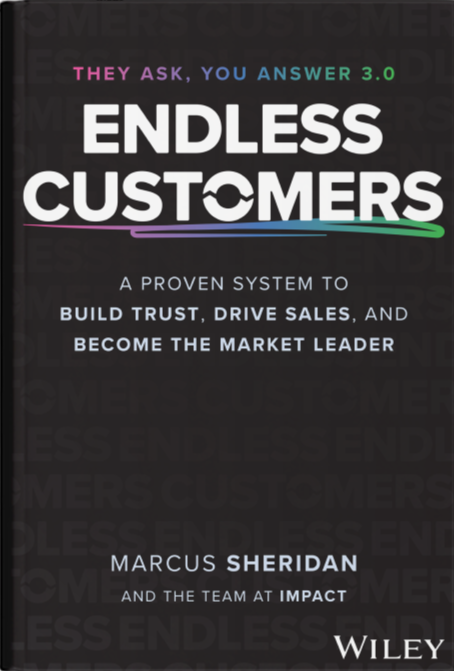In today’s episode of The Small Business Show, we’re joined by Marcus Sheridan, keynote speaker and best-selling author, to discuss how businesses can thrive by effectively answering customers’ questions. The third and latest edition of his classic series, They Ask, You Answer, titled Endless Customers: A Proven System to Build Trust, Drive Sales, and Become the Market Leader, will be released on April 15 and is currently available for pre-order.
Sheridan emphasizes that answering potential customers’ questions before they ask is critical for businesses looking to build trust, increase engagement, and drive sales.


Endless Customers: A Proven System to Build Trust, Drive Sales, and Become the Market Leader
Today’s buyers do extensive research before ever reaching out to a business. Sheridan points out that when a customer reaches a company, they are already 80% through the buyer’s journey. This means they have likely compared competitors, read reviews, and assessed pricing.
A study from Gartner, a research and consulting firm, found that 75% of B2B buyers now prefer a seller-free buying experience. Sheridan highlights that this reflects a more significant trend—buyers want more control over their purchasing decisions. To meet this demand, businesses must proactively provide answers to the questions that most companies hesitate to address.
Sheridan identifies five key subjects—what he calls the “Big Five”—that potential customers want to understand before they make a purchase.
Cost
Many businesses are reluctant to discuss pricing, but avoiding the topic can drive customers away. Sheridan outlines three reasons why companies often hesitate and why transparency is a better approach:
- Customized solutions: Many businesses claim, “It depends,” when asked about pricing. Instead of avoiding the question, companies should explain the factors that influence cost, helping customers understand what drives prices up or down.
- Fear of competition: Some businesses worry that disclosing prices will allow competitors to undercut them. Sheridan argues this mindset is flawed: competitors don’t pay your bills—customers do.
- Concerns about scaring customers away: Many companies fear sharing costs might turn away potential buyers. Customers who don’t get pricing information upfront will likely move on. If an exact number isn’t possible, providing a price range or explaining pricing factors is a strong alternative.
Problems
Customers don’t just want to know the benefits of a product or service—they also want to understand its limitations. Addressing potential downsides proactively builds trust and demonstrates confidence in what a business offers. Avoiding this discussion only creates skepticism.
Comparisons
Consumers often compare different brands, products, or services before making a decision. Sheridan suggests that businesses should embrace comparisons rather than fear them. Providing honest assessments of how a product stacks up against competitors—both strengths and weaknesses—helps buyers make informed choices.
Reviews
Many businesses hesitate to display both positive and negative reviews, fearing that negative feedback will deter customers. However, Sheridan stresses that today’s consumers want authenticity—they don’t trust companies that only showcase glowing testimonials. By openly sharing reviews and addressing concerns, businesses increase credibility and attract more engaged buyers.
Best
Buyers frequently search for “best” options when making a decision—whether it’s the best value, best performance, or best-rated product in a category. Instead of avoiding this, businesses should create content that helps customers navigate these choices, positioning themselves as industry leaders in the process.
Sheridan highlights that many companies avoid discussing these five topics out of fear that customers will go elsewhere. However, by failing to provide clear and direct answers, businesses risk losing trust and credibility. Today’s consumers value transparency more than ever. Companies that openly discuss pricing, address concerns, and offer honest comparisons will ultimately win more customers and outperform their competitors in the long run.
"You don't have to create or invent a new product. Generally, most disruption today happens when we sell or remarket something in a different way than everyone else. If you do that, you're going to stand out." – Marcus Sheridan






